A lot of people get scared when they hear the word "headline" and think it's all black magic and something only high-paid ad execs can do.. or people on that Mad Men TV show.. but at the core, headlines are actually really really simple.
If I could break it down for you I'd say that a headline is simply something that promises a specific benefit or reward for the reader in return for the valuable time it takes to read what you have to say.
That's it!
A headline is the first, and sometimes the ONLY impression you make on your visitor or reader... So without a great headline that turns a browser into a reader, a repeat visitor, or a customer, the rest of your words may as well not even exist.
Let me repeat that -- without a great headline that turns a browser into a reader, a repeat visitor, or a customer, the rest of your words may as well not even exist.
Advertising legend David Ogilvy knew the power of headlines.
He knew that his headline literally determined whether the advertisement would get read. He once RE-wrote a headline for Rolls Royce 104 times until he was satisfied that he'd nailed it:
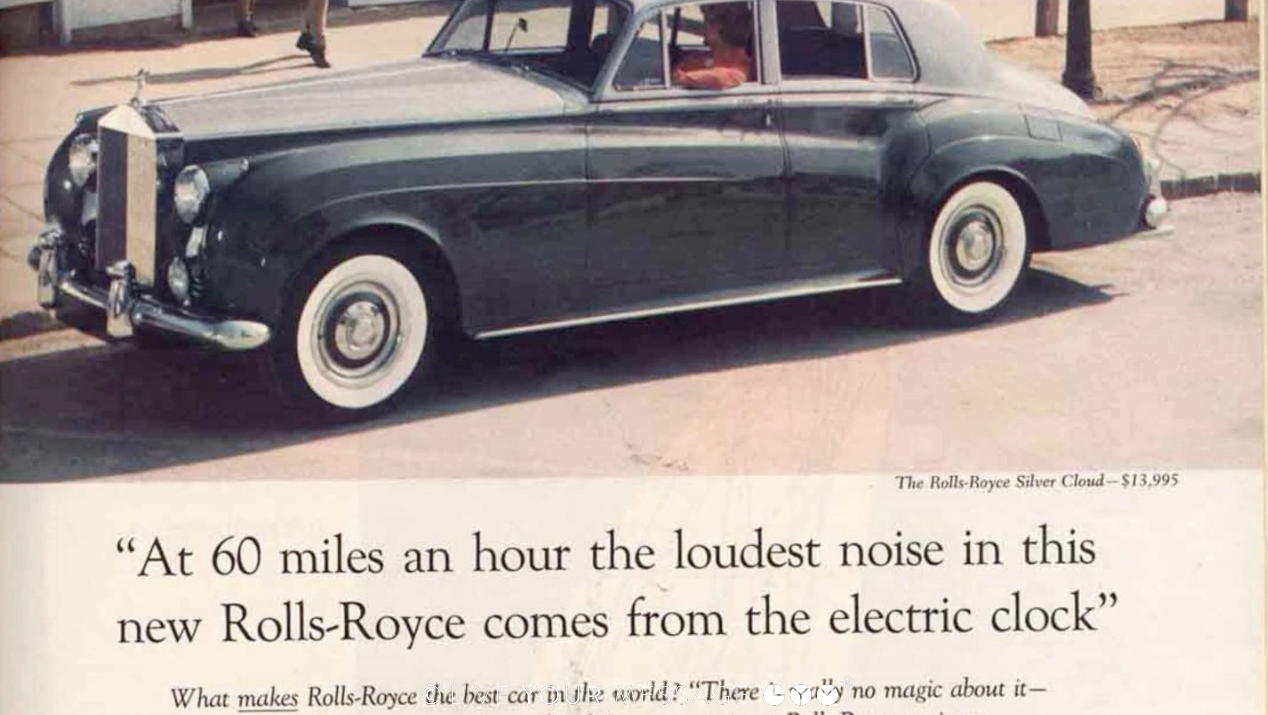
"At 60 miles an hour, the only thing you hear in the new Rolls Royce comes from the electric clock"
Master copywriter Gene Schwartz often spent an entire week on the first 50 words of a sales piece - the headline and the opening paragraph. Those 50 words are the most important part of any persuasive writing, and writing them well takes time. Even for the masters.
This means that the better the headline, the better your odds of beating the averages and getting what you've written read by a larger percentage of people.
Of course writing a great headline doesn't guarantee the success of your writing. You still need to provide what you promised in the headline with your body copy.
But great content with a bad headline is doomed to go unread. In fact, I won't even tell you how many websites I see every single day where not a single page has a headline. And they wonder why their visitors don't stick around and take action.
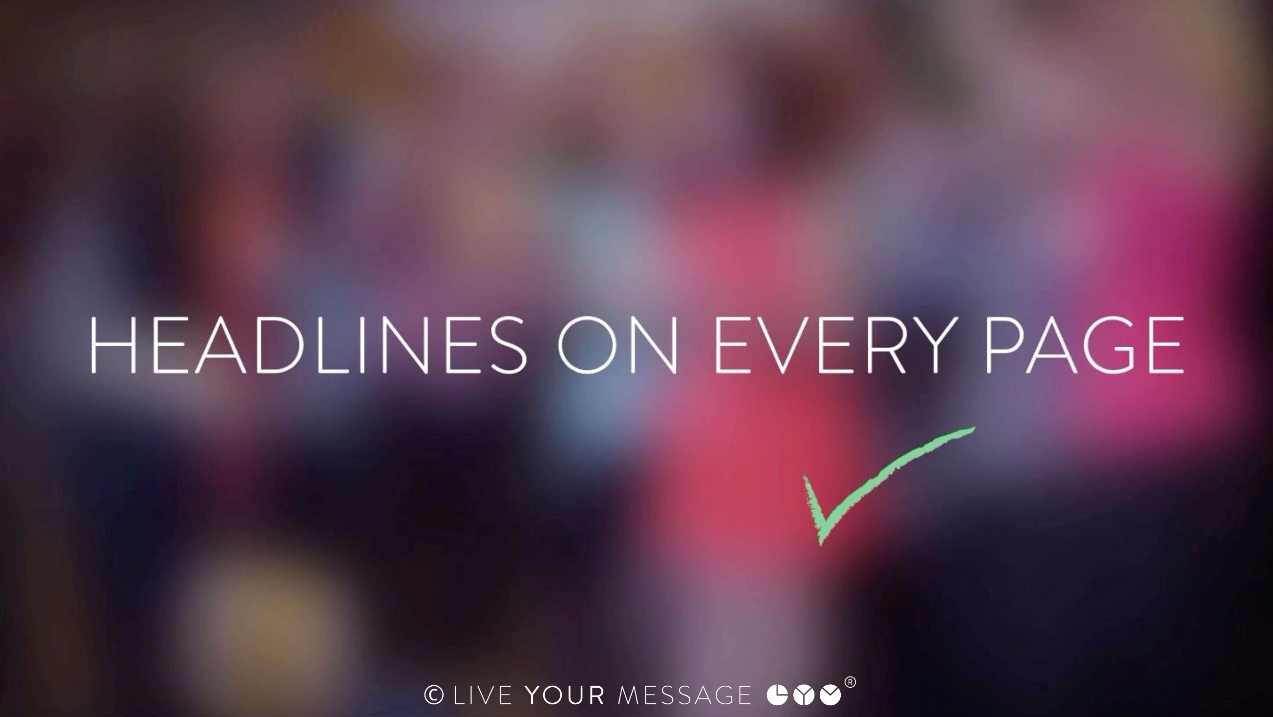
Without a headline on every single page on your site to attract and focus your visitor on what's important for that particular page, they end up bouncing around randomly, from thing to thing... and if they can't work out what your page is about after a few seconds of quick scanning, they'll leave.
OK - wait ... Did he really just say "a headline on every single page of your site"??
Why yes, I did.
Every single page of your website needs a headline to tell people 2 pieces of very important information: WHY they should stay and WHAT'S in it for them if they do. If there's no headline, then people won't stick around. We just don't have time to commit to read and comprehend a page unless we know what we're in for.
So - if you need to put a headline on each and every page, what kinds of headlines do you need? Great question!
So what I thought I would do is take you on a tour of some websites and explain how they're using their headlines to maximize their results by giving people those 2 pieces of very important information: WHY they should stay and WHAT'S in it for them if they do.
And once I've done that I'm going to go through some of the rules of Headline writing and then you're going to write a some headlines for your pages. If you already have headlines, then I'm going to ask you to use the rules of writing great headlines and come up with some even better ones than you currently have now.
Your Home Page Headline
OK - so first of all - let's talk about your Home Page. It's commonly considered the most important page on your site - and yet -- I see so many of them that go headline-less.
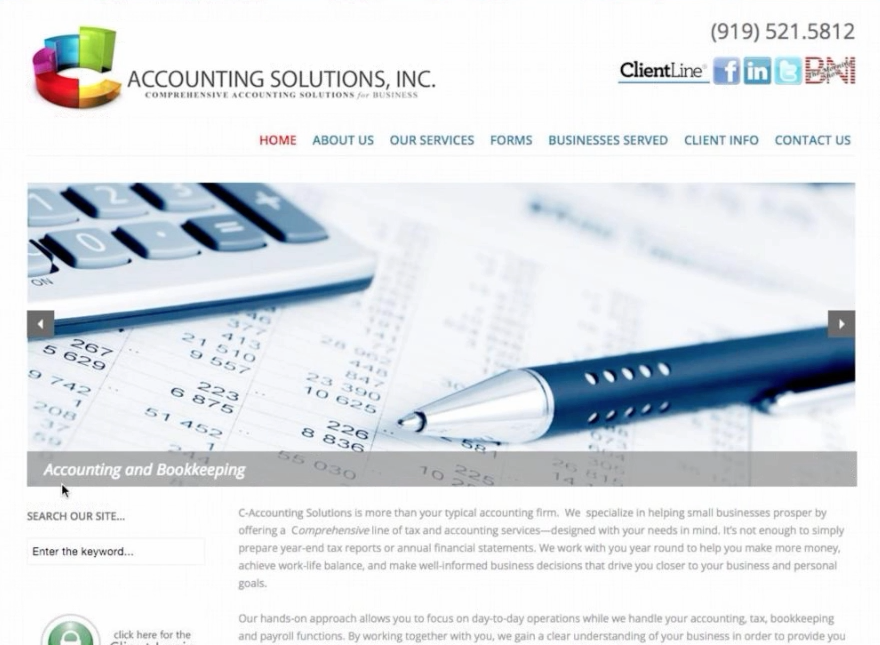
Here's an offender ..
How do people arriving at your site know who you are, what you're about, what's in store for them if you don't greet them with a headline? In this case, it's an accounting firm. I have no idea what they do, what work they specialize in, if any, or what they can do for me.
And just so we're on the same page: I want to be really clear about which headlines I mean..
I'm NOT referring to your company name, or a blog post title or any other type of editorial content headlines. Cosmo-style headlines may work just fine for your personal blog, but it's not going to sell you, your products or services.
What I'm talking about is the headline on your website home page.
So - the first good example I want to give you is from DesignBoost.com ..
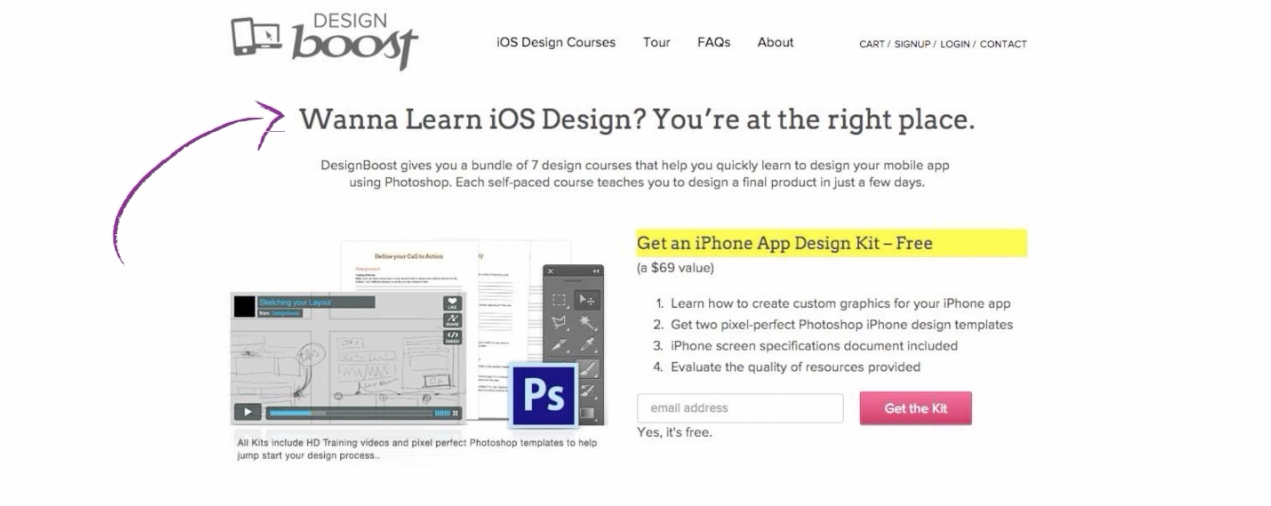
They greet visitors with a large, clear, promise: "Wanna Learn iOS Design? You're at the right place." If you're interested in learning iOS design, or if you clicked over to this site with the express intention of figuring out iOS design, then how are you going to feel landing on this page? Like you're in the right place.
So how do you come up with a great home page headline that's going to work to position you in the right way so that people understand what you do and why they should stay?
Great question - what I'm going to do is give you 3 headline formulas that are working today to do just that.
Now -- you should know that I hate the word ‘formula' as much as the next guy, but I'm gonna call these formulas anyway.
How did I come up with these? Not by rehashing age-old formulas or copywriting truths. I actually analyzed more than 500 headlines of successful websites and companies that get all or most of their business online (which means the headline on their website is important).
I looked at graduates of top startup incubators (Y Combinator, Techstars, 500 startups) that have achieved commercial success and businesses that made it onto the Inc 5000 list. I avoided looking at companies that are already huge and very successful - like let's say Google, Amazon or Facebook - those guys operate on totally different terms.
I'm not saying all of the companies that I looked at have great headlines. Absolutely not - many have a really sucky headline, or don't have one at all. What I discovered looking at these headlines were trends - "formulas" that were working for these businesses.
And quick disclaimer: while I did extensive analysis for this, it's not a scientific method. That being said, I strongly believe the formulas I derived from this will work very well. I use them in my work all the time.
Here are the formulas for writing headlines along with 3 examples for each:
Formula #1: Say what it is
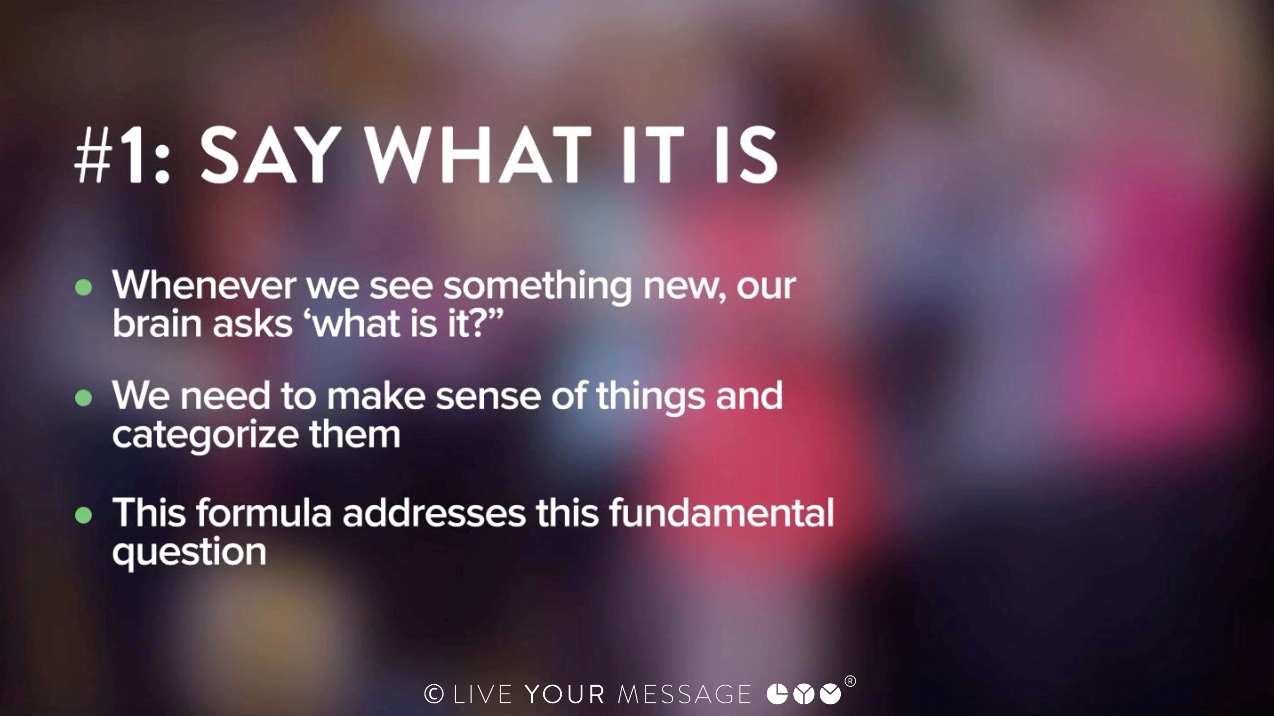
The brain is a questioning organ. Whenever we see something new, our brain asks ‘what is it?" And "is it dangerous?". We need to make sense of things and categorize them. This formula addresses this fundamental question.
First example of a great headline using this formula is RocketLawyer.com.
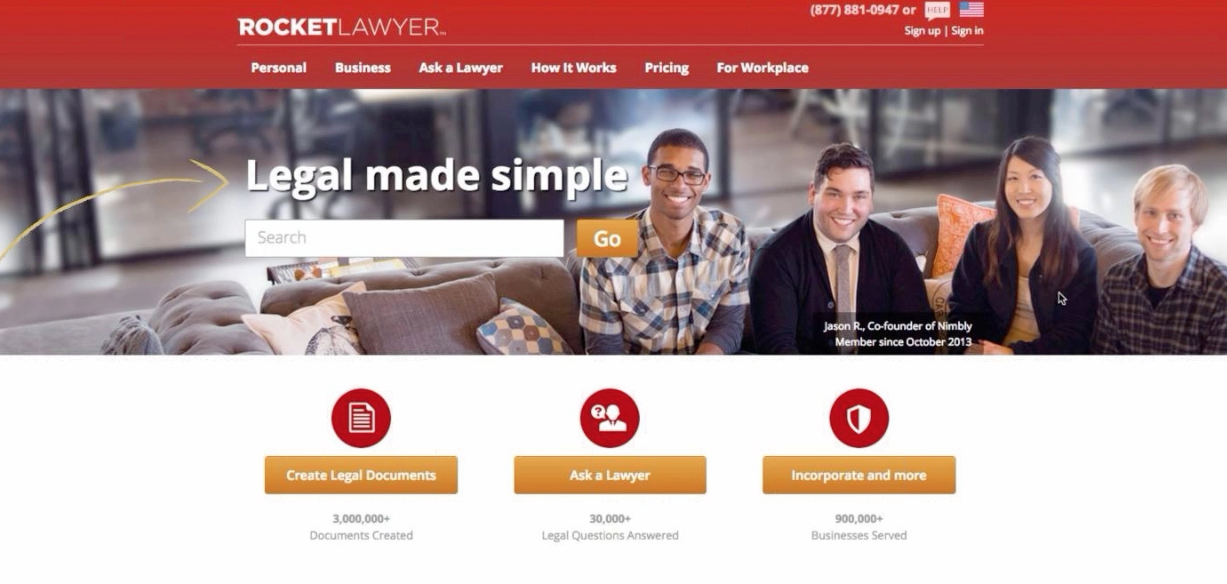
Their short, punchy headline explains what it is -- Legal Made Simple. There's no way to mis-interpret that and if you're in the market for that kind of service, then they've got you instantly with those 3 words.
Example number 2 is from Plated.com - a company specializing in home-delivered ingredients that allows you to make great meals yourself. Their headline dumbs it right down to: EATING WELL MADE EASY.
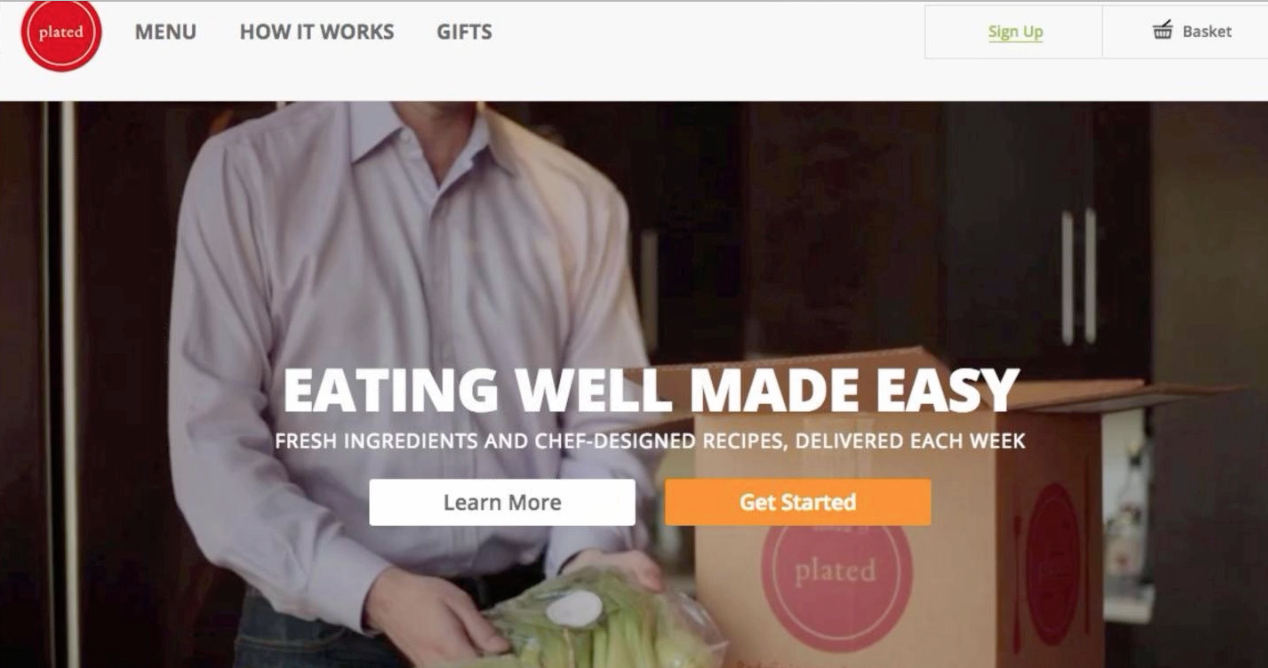 And one last example, this time from one of my clients Laurie Dupar, a coach for people who have ADHD -- she says exactly what it is -- COACHING FOR ADHD.
And one last example, this time from one of my clients Laurie Dupar, a coach for people who have ADHD -- she says exactly what it is -- COACHING FOR ADHD.
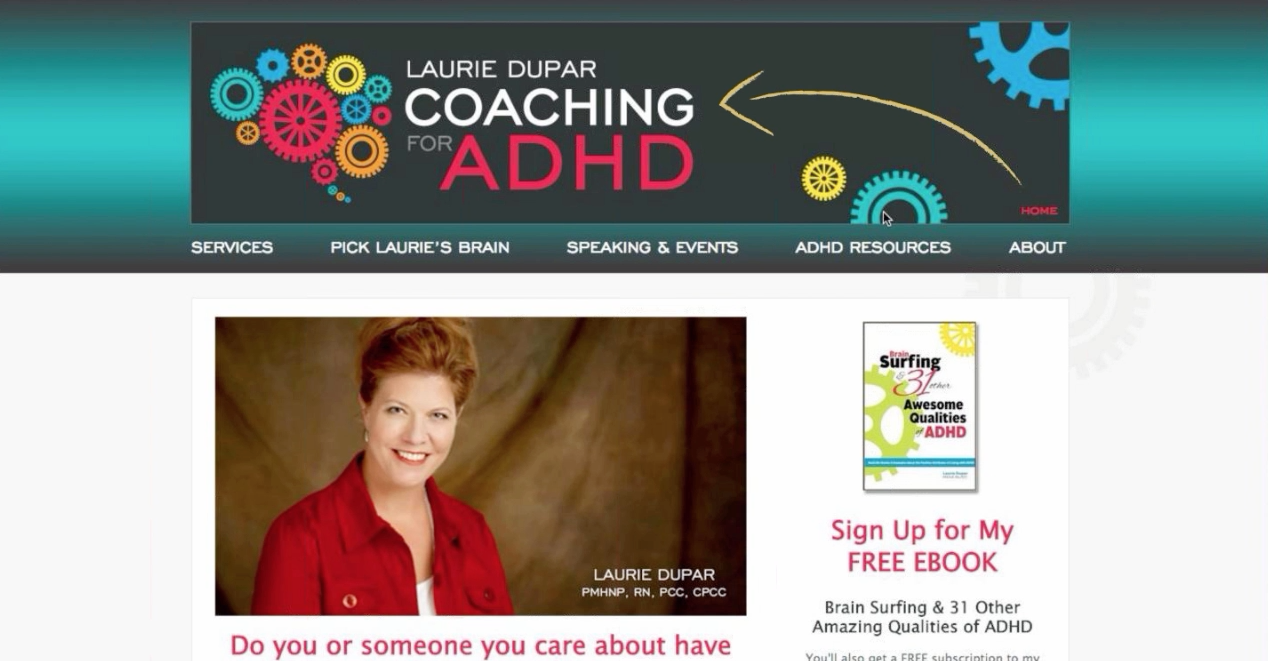
What a simple headline that enables you to instantly make sense of what the site is, who it's here to help, and why you should stick around ...
OK - so, exercise time.
Let's say I were to ask you to Say What It Is about you, your business, one of your product, or one of your service offerings ... how would you answer?
I'd like you to take a minute or two and write a handful of headlines that you can use on your Home Page to Say What It Is. as specifically as you can, and in as few words as possible.
I'm also going to ask you to write headlines for our other 2 next formulas, so don't worry too much if you can't come up with a bunch of options for this one. I'm going to start the clock now for 2 minutes. At the end of that time, I'd like to see some of your headlines in the question box please.
Formula #2: Say What They Get
137-9,pngSo many companies lead with their features. Feature after feature after feature. But nobody buys features. They buy the outcome you can give them. A single outcome - just one. If I were to tell you that you only had room in your headline for a single outcome, what would you write? What's the single most important thing a client will get from working with you?
Well - we asked web analytics company Crazyegg that question, and they answered with a question of their own...
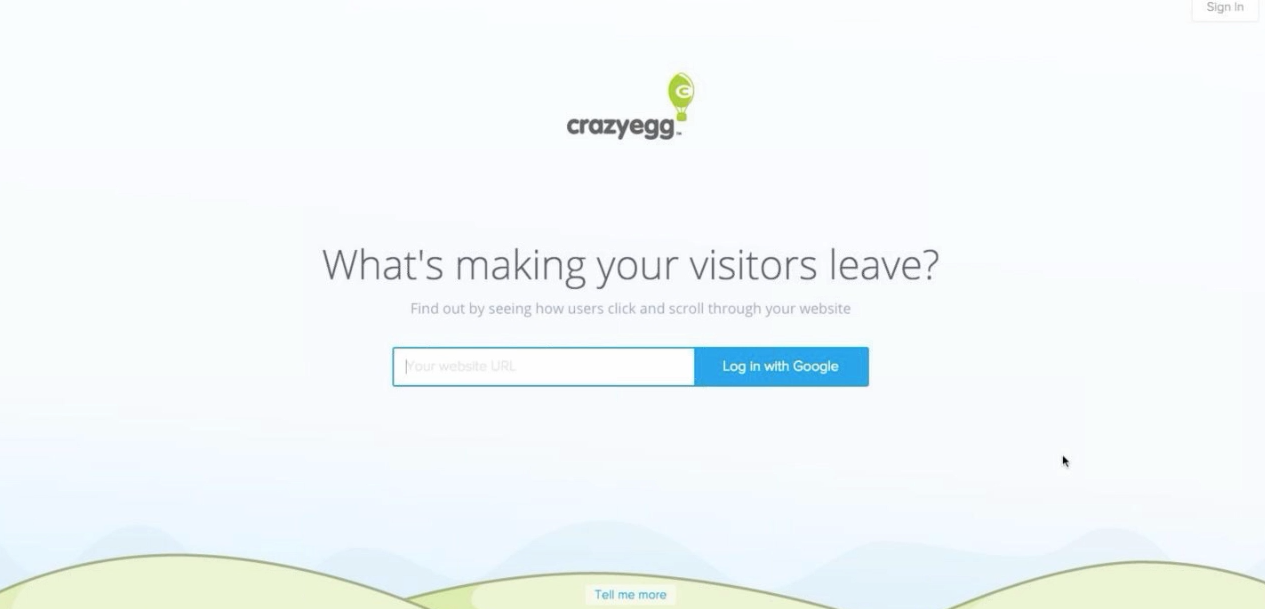
This is a software company that could have hidden behind feature after feature after feature.
But they sat down and figured out the biggest thing they could offer that would be of interest to their customers: one key piece of knowledge -- what's making your visitors leave?
So they crafted their headline around promising that key piece of information. What's making your visitors leave?
GENIUS. Who wouldn't want to know that?
And here's an example from Pandora.com -- the online radio station with thousands of stations, hundreds of thousands of artists, and billions of choices. Most people would lead with that feature -- the massive "choice", like the cable TV companies do. Hundreds of channels. You'll never be bored. And secretly we think -- hundreds of channels but they're all crap. But Pandora flipped it on its head. Their headline is: It's a new kind of radio - stations that play only music you like.
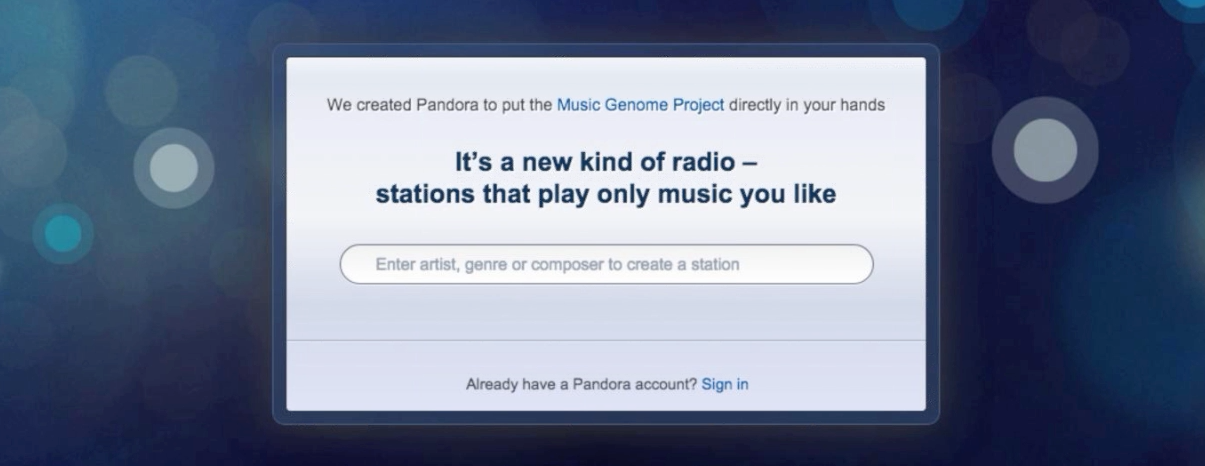
Again, GENIUS. Who wouldn't want that? So - I think you've got the idea of the "Say What They Get" formula for writing headlines.
So - let's do this. If you had a gun to your head, you only have enough time left to express the single most important, most valuable outcome to your visitor .... what would it be? Take care to filter it through your clients' eyes. Why would they want this?
I don't want to choose between a thousand radio stations -- I only want one ... one that plays only the music I like. I don't want more software. But I DO want to know why visitors are leaving my site. Do I smell?
So -- over to you. I challenge you to Say What They Get in a way that lights me up, pulls me in and gets me excited. So take a few minutes to jot down a handful of potential Say What They Get headlines about you, your business, one of your product, or one of your service offerings. What's the number 1 thing you have to say?
Formula #3: Say what you're able to do (with it)
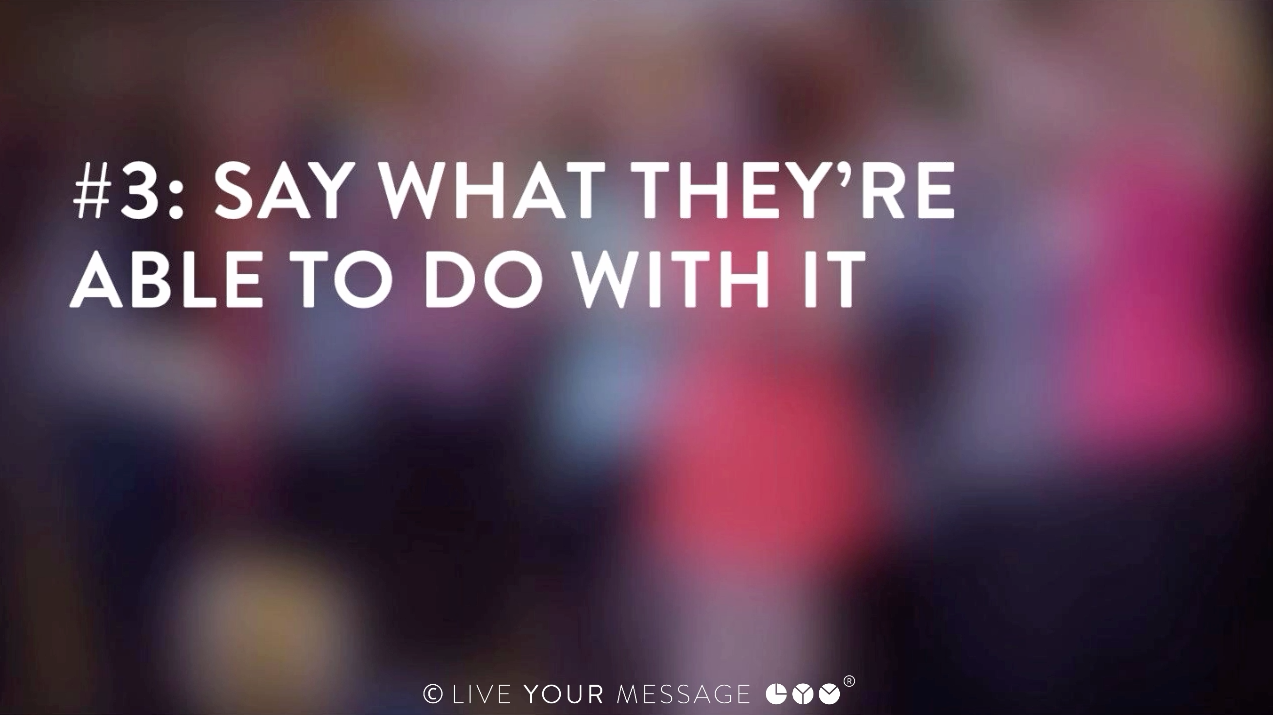
This is where the headline makes it clear what you're able to accomplish if you keep reading.
My first example is from coach and money goddess Morgana Rae's site -- "Make Money by putting LOVE first". Pretty compelling eh?
This is where the headline makes it clear what you're able to accomplish if you keep reading.
My first example is from coach and money goddess Morgana Rae's site -- "Make Money by putting LOVE first". Pretty compelling eh?

Next, I have a great example from the Lockitron website: Unlock Your Door Without Keys.
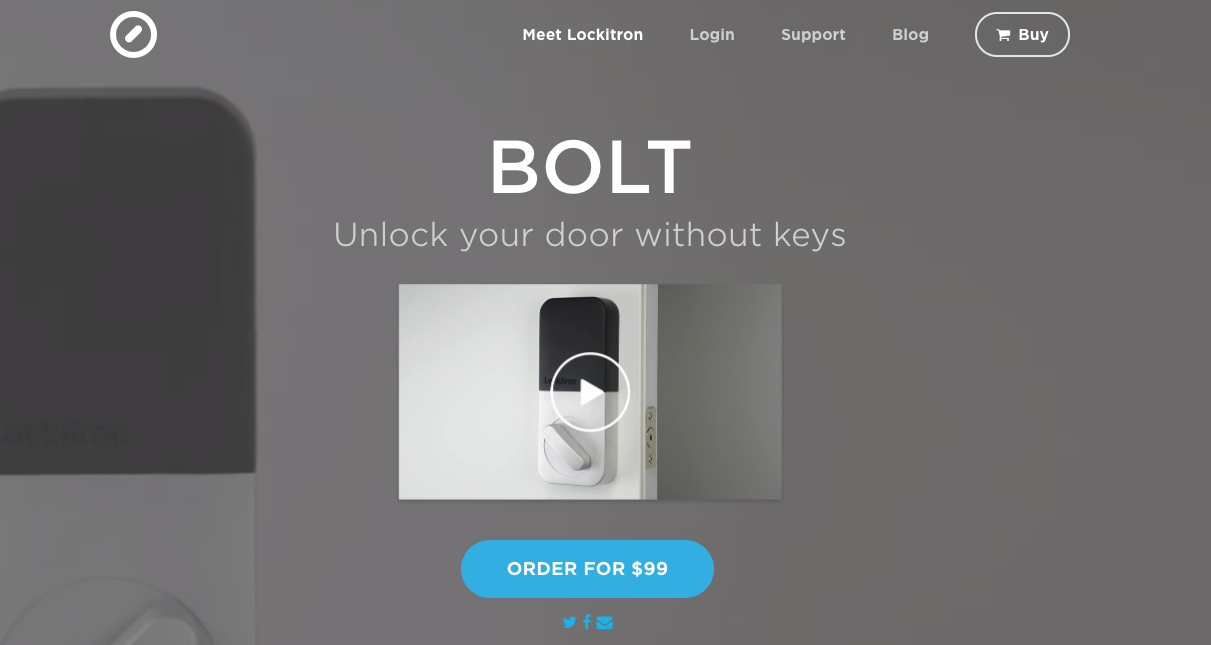
And my final example is from our own Live Your Message website is "Be the Superhero to Your Tribe".
OK - so what about you? What can we do with your information, your products, and your services? What's the #1 thing you'd like to promise people that they'll be able to do if they keep reading?
I recommend you keep creating until you have at least 25 headline ideas for your Home Page. Just keep punching them out. Take the time to just write and play with them. Shorten them. Lengthen them. Come up with different angles. Talk to your customers, find out the #1 thing that attracted them to do business with you and come up with 25 ways to express that reason in a headline.
Don't worry -- they don't all have to be winners. In fact, most of them will suck. But write them out anyway. Don't hold back. Don't limit yourself to X number of words. And don't delete a single headline - not even the half-assed, swearword-filled ones you write when you're thoroughly over this whole exercise.
Don't give up, you're hot on the trail of your ultimate headline!
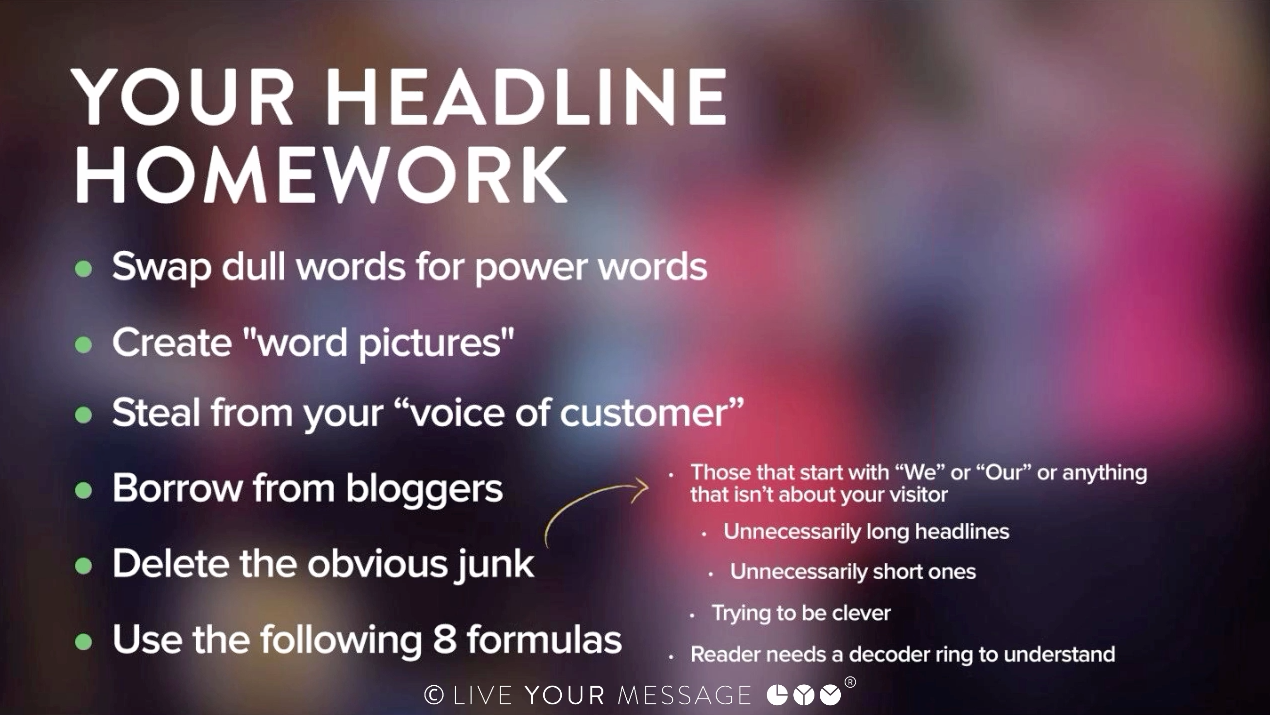
To get 25 variations on a single phrase, you can try the following:
- Swap dull words for sticky ones: Get on over to Thesaurus.com! Plug your boring words in to find interesting synonyms. For example, in the super-overused headline "save time and money", you might take the word "save" and look for a more memorable, powerful verb: "seize", "unshackle" or "shield". Sure, those sound crazy now, but they're memorably different, which is better than being safe and boring.
- Create word pictures: This is a classic long-form sales writing trick made famous by Robert Collier. Your words can and should, where possible, create mental images. That may mean using an analogy, simile or metaphor. It may mean piggy-backing off power-packed images, like the American flag, a wizard, or a lost puppy. The idea is to create a sharp visual that will make your message stickier. Note: This is the only place you get to be creative in headline-writing... but keep in mind that it needs to be done clearly.
- Steal from your "voice of customer". Talk to your customers as I suggested a second ago. Ask them their opinion in an online survey. I've found that there are usually a few gems in survey responses because your customers may be able to see things from a fresher perspective than you can.
- Borrow from bloggers -- Journalists and bloggers are skilled at getting to the point quickly and with memorable yet simple words and analogies.
- Plug in "newsy" or credible data. Did someone recently do a study you can leverage? Did you? Take data from wherever you can find it - as long as it's reliable - and make a few headline variations that incorporate actual numbers. Tip: Use numerals (i.e., 47) instead of written numbers (i.e., forty-seven).
- Finally, delete the obvious junk. There's a lot to be learned from the bad work you do, which is why I told you not to delete any of your ideas in the previous step. Bad ideas can be seeds for great ideas. But sometimes crap is crap. So go through your list of 25 headlines now, and yank out the real stinkers.
Crummy headlines include-
- Those that start with "We" or "Our" or anything that isn't about your visitor.
- Unnecessarily long headlines
- Unnecessarily short ones (which usually become meaningless or so generic that any of your competitors could easily say the same thing)
- Those that are trying to be clever.
- Those that require a decoder ring to understand - like industry jargon, or assuming readers have a certain level of knowledge about what you do or your industry.
Lots of people found these next topics pretty useful...
- Finally, delete the obvious junk. There's a lot to be learned from the bad work you do, which is why I told you not to delete any of your ideas in the previous step. Bad ideas can be seeds for great ideas. But sometimes crap is crap. So go through your list of 25 headlines now, and yank out the real stinkers.
Crummy headlines include-
- Plug in "newsy" or credible data. Did someone recently do a study you can leverage? Did you? Take data from wherever you can find it - as long as it's reliable - and make a few headline variations that incorporate actual numbers. Tip: Use numerals (i.e., 47) instead of written numbers (i.e., forty-seven).
- Borrow from bloggers -- Journalists and bloggers are skilled at getting to the point quickly and with memorable yet simple words and analogies.
- Steal from your "voice of customer". Talk to your customers as I suggested a second ago. Ask them their opinion in an online survey. I've found that there are usually a few gems in survey responses because your customers may be able to see things from a fresher perspective than you can.
- Create word pictures: This is a classic long-form sales writing trick made famous by Robert Collier. Your words can and should, where possible, create mental images. That may mean using an analogy, simile or metaphor. It may mean piggy-backing off power-packed images, like the American flag, a wizard, or a lost puppy. The idea is to create a sharp visual that will make your message stickier. Note: This is the only place you get to be creative in headline-writing... but keep in mind that it needs to be done clearly.
